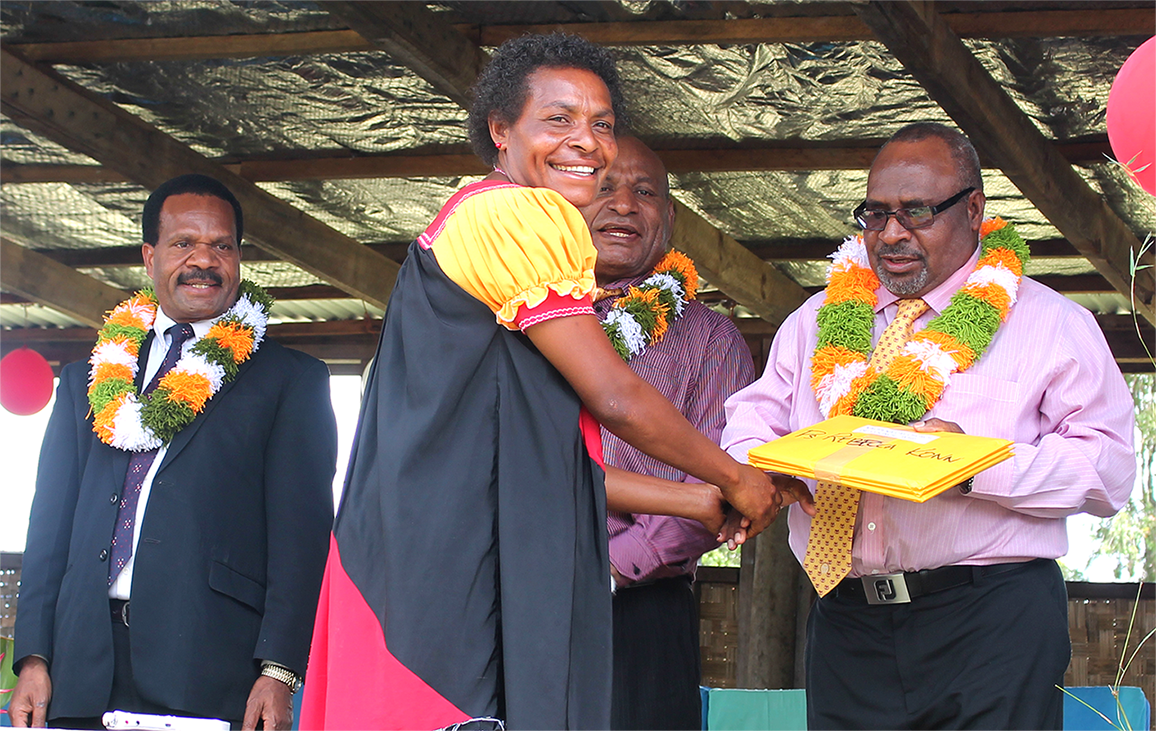|
On the 30th APRIL, 2015 – Hundreds of residents from Western Highlands, Jiwaka and Enga Province in Papua New Guinea (PNG) celebrated the completion of their financial education training in a mass graduation ceremony at Queens Park Oval — marking another major milestone for the Microfinance Expansion Project (MEP), supported by the Asian Development Bank (ADB), Australian Government (DFAT) and Papua New Guinea Government (GoPNG).
The Australian Government’s Department of Foreign Affairs & Trade (DFAT), First Secretary- Governance, Mr.Simon Roz, presented 5,000 graduates with their certificates at the ceremony attended by representatives from the Microfinance Expansion Project, Bank of Papua New Guinea, Department of Treasury, Financial Instructions, NGOs, CBOs and Women Groups.
Mr. Benny Popoitai, Deputy Governor, BPNG gave the keynote address stating that; “the demand for access to financial knowledge and services in rural areas is growing. MEP has enabled rural low income earners to get access to financial awareness for the first time. Our challenge is to keep expanding our financial literacy activities to ensure more people are financially educated and help low income earners contribute to economic development.”
“Microfinance Expansion Project is a government initiative to promote financial inclusion through financial literacy. A well over 8 million people in Papua New Guinea will acquire financial education over the years”, said Mr Popoitai. He praised the participants for engaging in this Financial Education Training and thanked Komoka One (K1) Association for its partnership. He further encouraged, participants to continue to spread the knowledge they have acquired to the people in their respective family groups and communities.’’
An estimated 85% of the population in PNG does not have access to financial services. The low-income population of the country are termed as ‘core excluded’, in terms of the extent of financial exclusion, as they conduct their financial transactions completely outside the regulated financial system, mostly on a cash-only basis and sometimes in-kind. Amongst the several causes of financial exclusion, the primary ones are – high costs associated with small value transactions, lack of infrastructure, and lack of client-centric products, rigid processes and weak delivery models.
The Government in its effort to promoting the financial inclusion agenda in PNG have initiated the Microfinance Expansion Project (MEP) which is co-financed by the Asian Development Bank (ADB), the Australian Agency for International Development (AusAID) or DFAT and the Government itself through counterpart support. Bank of Papua New Guinea (BPNG) is the executing agency of this project. The Project has an overarching goal of enhancing financial inclusion by extending financial services to the bulk of the rural population in PNG.
The project is designed to provide financial education to 120,000 people across PNG and increase financial inclusion in PNG by improving access to financial services in the country by the end of 2017 also supports social empowerment of women. It was encouraging to note that half of the 5,000 graduands were women. The project was launched in April 2012, with BPNG as the executing agency and MicroSave as technical partner. The Centre for Excellence in Financial Inclusion was incorporated as part of the project’s outputs and is the main agency for coordinating financial inclusion and financial education initiatives in PNG. Furthermore, the project aims to enhance financial inclusion by:
- Strengthening the financial institutions that focus on servicing the rural population through capacity building and training;
- Training the community on financial education and business development services;
- Working with networks to establish industry standards and best practices;
- Promote lending by microfinance institutions by providing the Risk Share Facility; and
- Developing a conducive regulatory environment, and strengthening supervision by working closely with regulators.
Financial Literacy Training is one of the biggest outputs in this Microfinance Expansion Project. It has a target to reach 120,000 people, of which 40% are women. Six training modules have been developed which are; Savings, Budgeting, Debt Management, Bank Services, financial negotiations and Mobile Banking.
The project has partnered with K1 Association to deliver trainings in the Highlands region covering WHP, SHP, Enga and Jiwaka Provinces to reach 50,000 people. So far they have received the Training of Trainers (TOT) training from the project and have trained over 5,000 people for which it’s Mass Graduation and Certificate presentation is held in Western Highland Province where majority have trained.
|








